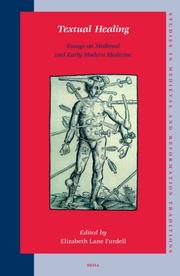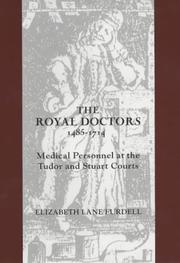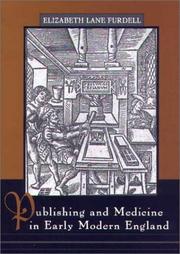| Listing 1 - 7 of 7 |
Sort by
|

ISBN: 9004146636 9047415558 9789004146631 9789047415558 Year: 2005 Volume: 110
Abstract | Keywords | Export | Availability | Bookmark
 Loading...
Loading...Choose an application
- Reference Manager
- EndNote
- RefWorks (Direct export to RefWorks)
Medicine --- Medicine, Medieval --- History --- Religious aspects --- Medicine [Medieval ] --- Sources --- Medicine - History --- Medicine - Religious aspects --- History of Medicine --- Medieval medicine
Book
ISBN: 128240072X 9786612400728 9047425979 9789047425977 9789004172500 9004172505 9781282400726 Year: 2009 Publisher: Leiden Boston Brill
Abstract | Keywords | Export | Availability | Bookmark
 Loading...
Loading...Choose an application
- Reference Manager
- EndNote
- RefWorks (Direct export to RefWorks)
Although ancient and medieval doctors knew of the disorder called diabetes, the disease they treated was rare and largely confined to young sufferers. By the late Renaissance, however, the increasing incidence of diabetes in older adults required a re-examination of what caused the malady and how to cure it. Led by English healers, such as controversial apothecary Nicholas Culpeper and elite physician Thomas Willis, the study of diabetes produced significant debate in print over the locus of the disease and remedies for its treatment. These debates paralleled the growing schism in English medical circles over contradictory iatric theories and professional jurisdiction. On the eve of insulin's discovery, diabetologists still quarrelled over what diets might alleviate its symptoms. Including perspectives from patients and drawing on myriad sources, this book examines changing approaches to diabetes and its victims within the context of medical and scientific progress.
Diabetes Mellitus --- Insulin --- Diabetes --- Brittle diabetes --- Diabetes mellitus --- IDDM (Disease) --- Insulin-dependent diabetes --- Ketosis prone diabetes --- Type 1 diabetes --- Carbohydrate intolerance --- Endocrine glands --- Diabetic acidosis --- Glycosylated hemoglobin --- history. --- History. --- Diseases --- Great Britain. --- Great Britain --- Isle of Man

ISBN: 1580460518 Year: 2001 Publisher: Rochester (N. Y.) : University of Rochester press,
Abstract | Keywords | Export | Availability | Bookmark
 Loading...
Loading...Choose an application
- Reference Manager
- EndNote
- RefWorks (Direct export to RefWorks)
Medicine --- Medicine --- Physicians --- Physicians --- History --- History --- History --- History

ISBN: 9781580466004 9781580460514 Year: 2001 Publisher: Rochester, N.Y., USA University of Rochester Press
Abstract | Keywords | Export | Availability | Bookmark
 Loading...
Loading...Choose an application
- Reference Manager
- EndNote
- RefWorks (Direct export to RefWorks)
Book
Year: 2005 Publisher: Leiden Brill
Abstract | Keywords | Export | Availability | Bookmark
 Loading...
Loading...Choose an application
- Reference Manager
- EndNote
- RefWorks (Direct export to RefWorks)
Medicine, Medieval --- History --- Sources
Book
ISBN: 1281382833 9786611382834 1580466001 Year: 2001 Publisher: Rochester, N.Y., USA : University of Rochester Press,
Abstract | Keywords | Export | Availability | Bookmark
 Loading...
Loading...Choose an application
- Reference Manager
- EndNote
- RefWorks (Direct export to RefWorks)
Drawing upon a myriad of primary and secondary historical sources, The Royal Doctors: Medical Personnel at the Tudor and Stuart Courts investigates the influential individuals who attended England's most important patientsduring a pivotal epoch in the evolution of the state and the medical profession. Over three hundred men [and a handful of women], heretofore unexamined as a group, made up the medical staff of the Tudor and Stuart kings and queensof England [as well as the Lord Protectorships of Oliver and Richard Cromwell]. The royal doctors faced enormous challenges in the sixteenth and seventeenth centuries from diseases that respected no rank and threatened the very security of the realm. Moreover, they had to weather political and religious upheavals that led to regicide and revolution, as well as cope with sharp theoretical and jurisdictional divisions within English medicine. The rulers often interceded in medical controversies at the behest of their royal doctors, bringing sovereign authority to bear on the condition of medicine. Elizabeth Lane Furdell is Professor of History at the University of NorthFlorida.
Physicians --- Medicine --- History

ISBN: 1580461190 Year: 2002 Publisher: New York Woodbridge University of Rochester Press Boydell & Brewer
Abstract | Keywords | Export | Availability | Bookmark
 Loading...
Loading...Choose an application
- Reference Manager
- EndNote
- RefWorks (Direct export to RefWorks)
Medicine --- Printing --- History --- England --- 16th century --- 17th century
| Listing 1 - 7 of 7 |
Sort by
|

 Search
Search Feedback
Feedback About UniCat
About UniCat  Help
Help News
News